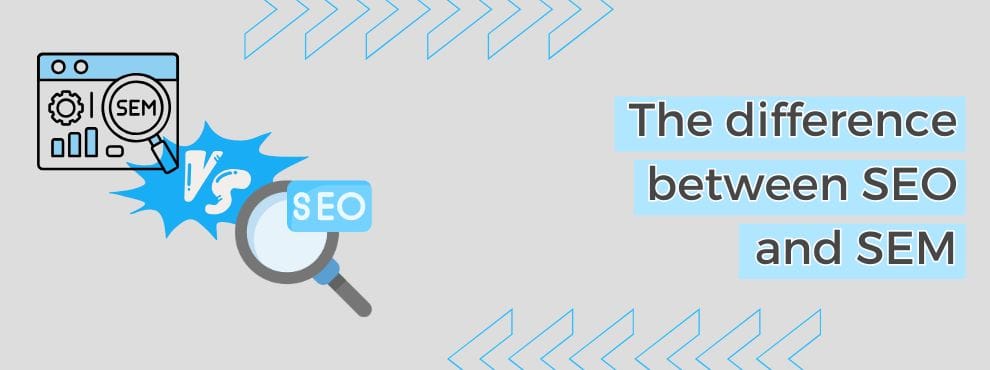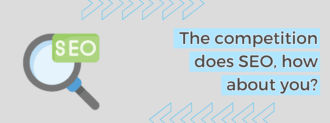In today’s digital world, where online competition is increasingly intense, companies are constantly looking for effective strategies to stand out and attract their target audience. Two of the most popular tactics for improving search engine visibility are SEO (Search Engine Optimization) and SEM (Search Engine Marketing). Although these terms are often confused or used interchangeably, they represent different approaches that can have a significant impact on the success of an online store. In this article, we will explore in depth the differences between SEO and SEM, their advantages and disadvantages, and help you determine which option is right for your business.
Table of contents
what is SEO?
SEO, or organic search engine optimization, refers to the set of strategies and techniques used to improve the position of a website in the organic results of search engines such as Google. The goal of SEO is to attract quality traffic without resorting to paid advertising, achieving long-term sustainable visibility.
SEO is based on several pillars, such as optimizing content by using relevant keywords, improving the structure of the website to facilitate its indexing, and building quality external links (backlinks). In addition, factors such as site loading speed, user experience (UX) and adaptability to mobile devices also play a key role.
The main advantage of SEO is that, once good positions are achieved in search results, the traffic obtained is usually constant and free. However, SEO results are not immediate and require time, effort and technical knowledge to be maintained over time.
what is SEM?
On the other hand, SEM refers to search engine marketing through paid ad campaigns. Google Ads is the most widely used platform for this purpose, allowing companies to display their ads in the first results of the search engine or on partner websites. SEM is based on a pay-per-click (PPC) model, meaning that you only pay when a user clicks on the ad.
SEM offers almost immediate results, making it an attractive option for businesses looking to generate traffic and sales quickly. It also allows for a high degree of targeting, meaning that ads can be shown to specific users based on their location, interests, online behavior and more.
However, SEM also has its challenges. Costs can be high, especially in sectors with high competition, and once the investment stops, the traffic derived from the ads disappears. Therefore, SEM requires careful planning and an ongoing budget to maintain its effectiveness.
Main differences between SEO and SEM
Although SEO and SEM share the goal of increasing search engine visibility, there are key differences between the two approaches. SEO focuses on achieving long-term, sustainable, organic results, while SEM provides immediate results through paid advertising. SEO requires time and effort to see results, but these can be sustained without additional costs once achieved. In contrast, SEM provides instant traffic, but at an ongoing cost.
Another important difference lies in the nature of the traffic. SEO tends to attract users who are looking for specific information or solutions and rely more on organic results. SEM, on the other hand, can be ideal for promotional campaigns, product launches or strategies that require a quick response from the market.
Advantages of SEO
SEO presents multiple benefits for companies that want to establish a solid and lasting online presence. First, it provides high-quality organic traffic, which means that visitors who arrive through organic results are more likely to be genuinely interested in what is being offered. In addition, SEO helps build brand authority and credibility, as users tend to trust organic results more than paid ads.
Another significant advantage of SEO is its long-term cost-effectiveness. Although it requires an initial investment in time and resources, once a good position in search results is achieved, maintaining that position is usually less costly compared to SEM. In addition, SEO improves the user experience by optimizing site speed, navigation and relevant content, which can also increase the conversion rate.
Advantages of SEM
SEM, on the other hand, offers a number of benefits that make it a valuable strategy for certain business objectives. The main advantage is the speed with which results can be obtained. Unlike SEO, which takes time to see its effects, SEM allows traffic and conversions to be generated almost immediately after the launch of a campaign.
In addition, SEM provides a high level of control and flexibility. Campaigns can be adjusted in real time based on performance, and daily or monthly budgets can be set to control spending. Precise targeting is another strength of SEM, as it allows ads to be targeted to specific audiences, which increases relevance and the likelihood of conversion.
which is better for you?
Determining whether SEO or SEM is the best option for your business depends on several factors, such as your goals, budget and the time available to get results. If you are looking for immediate results, for example, for a special promotion or new product launch, SEM might be the more appropriate choice. Its ability to generate instant traffic and measure results in real time makes it ideal for short-term strategies.
On the other hand, if your goal is to build a sustainable online presence and generate consistent traffic over the long term, SEO is the most recommended option. Although it takes time to see results, SEO can provide a higher return on investment in the long run and strengthen your brand’s authority in the marketplace.
In many cases, the combination of both strategies can be the key to success. Implementing an SEM strategy while working on SEO can provide quick results while building a solid foundation for the future.
Conclusion
Both SEO and SEM are fundamental strategies in digital marketing, each with their own advantages and challenges. SEO offers sustainability, authority and long-term profitability, while SEM provides quick results, control and flexibility. The choice between SEO and SEM will depend on your specific business needs, your goals and your available resources.
At IDX Innovadeluxe, we understand the importance of these strategies to the success of an online store. Our team of experts can help you design and implement the most appropriate digital marketing strategy for your business. Ready to take your online store to the next level? Contact us and find out how we can help you get there!
Related Posts







Deja un comentario